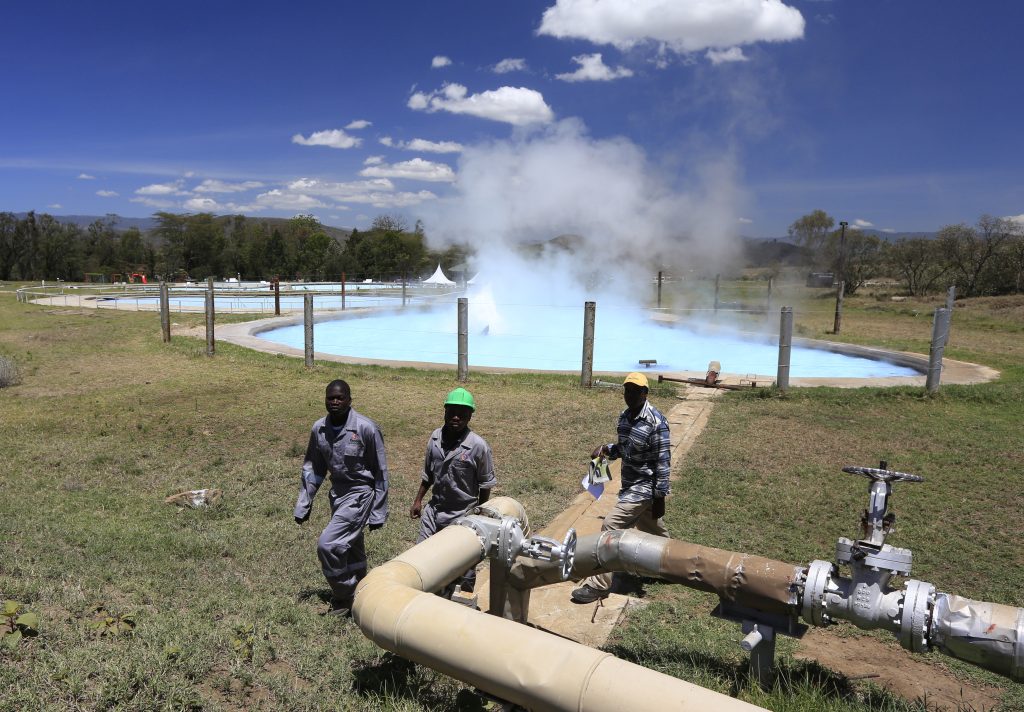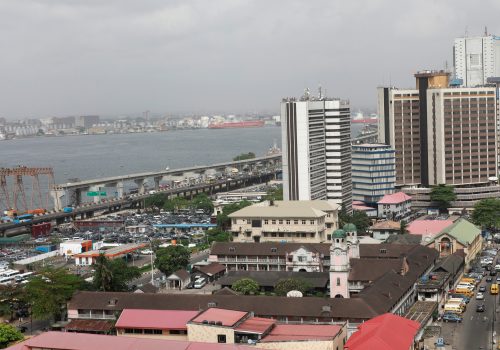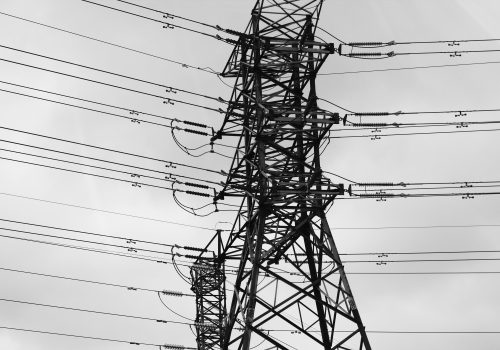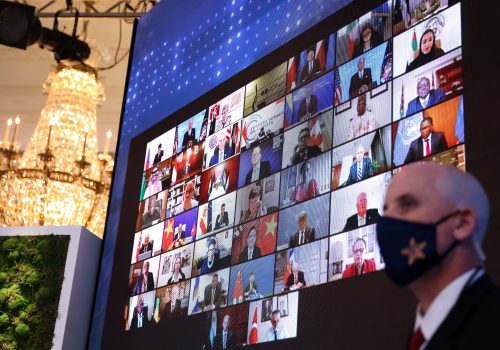Through carbon markets, corporations have a role to play in Africa’s development. They should take it seriously.
Corporations are in a unique position to responsibly engage in the “wild west” that is the carbon-offset market, all while supporting Africa’s rising low- and middle-income populations.
Through the purchase of carbon credits, corporations can immediately reduce their global carbon footprints while also serving their long-term economic interests to expand their market bases. That is in part because, by purchasing high-quality carbon credits in voluntary carbon markets, these companies can support the sustainable growth of low- and middle-income populations in the world’s fastest-growing regions—including across the African continent.
Voluntary carbon markets allow entities like corporations and individuals to buy carbon credits entirely at their discretion to offset their emissions. These markets differ from compliance markets, which feature legally binding emissions-reduction obligations, often under cap-and-trade structures like those in the European Union and California. Carbon credits are not intended to replace corporate emissions-reduction efforts; rather, they can serve as an additional mechanism to accelerate transitions to net zero, offset unavoidable emissions, and direct capital to regions with insufficient local investment.
Although still relatively immature, voluntary carbon markets have grown considerably—in 2022, their overall value surpassed two billion dollars, a fourfold increase from 2020, and African credits have grown 36 percent on average over the last five years. However, this rapid growth coupled with a lack of underlying structure has led to various issues, including concerns about the quality and legitimacy of many carbon credits sold, which cast doubt on the credits’ actual contributions to climate-change mitigation and stall market growth. Additionally, some carbon credits, which are primarily purchased by corporations based in the Global North, have hindered development in the Global South. For example, some governments in the Global South have forced local communities to sell land for the purpose of creating carbon credits. Organizations such as the Integrity Council for the Voluntary Carbon Market are working to solve the various issues related to the voluntary carbon market; in March, it released the first part of its “Core Carbon Principles,” outlining standards around carbon credits to ensure that offset efforts create verifiable impact.
Carbon-credit prices currently lack standardization, with prices being determined by the type or specific characteristics of the credits. They typically range from under four dollars per ton for lower-quality credits, often renewable energy projects, to over one hundred dollars for higher-quality credits, mainly tons removed from the atmosphere through carbon-removal technologies such as direct air capture. However, with large-scale removal technology still in development stages, removal projects accounted for just 3 percent of all projects issuing credits in 2022. In recent years, low-priced or “junk” credits have flooded the market, enabling dozens of companies to claim carbon-neutral status while only making limited environmental impact. At the twenty-seventh United Nations Climate Change Conference of the Parties, Kristalina Georgieva, head of the International Monetary Fund, asserted that unless carbon credits are priced on a trajectory that attains a seventy-five-dollar average price per ton by 2030, climate goals will remain out of reach. While Georgieva’s comments were likely targeted at compliance markets, pricing between the two markets is inherently connected, and there’s interest in formalizing that connection. By adopting thoughtful carbon-credit-purchasing strategies, including by supporting higher-quality credits that accurately reflect the value of a carbon ton, corporations can strengthen the voluntary carbon market and help it integrate it with compliance markets, rather than delegitimize it.
As rating agencies in the industry mature, corporations will need to take it upon themselves to work with these players and do their own due diligence to ensure that the carbon credits they purchase are high quality, as determined by key characteristics. For example, high-quality credits are “additional”: In other words, the emission reduction would not have occurred without the offset financing activity, an increasingly difficult hurdle for renewable energy credits. A high-quality credit is also quantifiable, in that it is produced by a project that can properly track resulting emissions reductions, and brings other environmental benefits such as improving air quality or enhancing biodiversity. Corporations may need to hire teams to analyze and determine the best partners to purchase credits from or work with trusted brokers with shared values. It will require collaborating with governments, banks, and other industry players to help build the necessary infrastructure and integration with compliance markets.

Thoughtful participation comes at a price, leaving open the question of why corporations should, if not mandated, participate sincerely or meaningfully in voluntary carbon markets at all. Engaging cheaply just to claim carbon-neutral status, what many call “greenwashing,” will likely become meaningless to consumers soon. While corporations may be incentivized to invest in credits to get ahead of regulatory risk or to appease investors, another often unmentioned reason is to support and grow their future consumer bases. Many opportunities for high-quality carbon credits are in the Global South, which will be disproportionately affected by climate change—and also host the largest urban centers and burgeoning middle-income populations. By the end of the century, Africa is projected to be the only continent experiencing population growth and will be home to thirteen of the world’s twenty largest urban areas. India’s population just surpassed China’s. If the Global South is not supported in its sustainable growth, achieving climate goals will become nearly impossible, and economic environments will become less prosperous.
Instead, by purchasing high-quality carbon credits, corporations can help build a sustainable future that expands economic opportunity in the Global South. For example, corporations can purchase reduction credits by supporting organizations like KOKO Networks, which developed a bioethanol cooker and fuel dispensary service in the hopes of transitioning the third of the world’s population that currently cooks on charcoal or wood (particularly in Africa and Southeast Asia) to a less carbon-heavy and less pollutive fuel source. By integrating hardware (their cookstove) with software (data collected at their dispensaries) KOKO Networks is able to properly measure its carbon impact and issue carbon credits to account for the reduction in emissions. Other such organizations are LifeStraw, which prevents carbon-dioxide emissions generated from boiling water via wood or charcoal by offering a drinking straw that filters water, and Mauto, which recently closed a five-million-dollar transaction to deploy electric two-wheelers across Africa. While more advanced technologies for carbon removal may prove fruitful in the future, corporations should not overlook the credits available today via initiatives like these that can have an immediate impact on ensuring Africa and other regions’ low- and middle-income populations grow sustainably.
Carbon-reduction credits (in contrast to carbon-removal credits) can help shift high-polluting consumer behaviors to sustainable practices in the world’s fastest-growing markets. When purchasing a bioethanol cookstove or an electric vehicle is not financially feasible in African markets, the sale of carbon credits could effectively subsidize these products and make them available to consumers at competitive prices. On the individual level, a mother in Nairobi can cook cleanly in her home, improving her family’s health, resulting in possibly lower medical costs or fewer days of missed work. On a larger scale, avoiding deforestation can help lessen the local impact of climate change because forests regulate weather conditions and help to avoid massive droughts or monsoons that can destroy crops and livelihoods. It is in corporations’ best interest to ensure African consumers are increasingly economically advantaged, a reality that is only possible through sustainable expansion, and carbon credits serve as one tool to support this growth.
By participating in the voluntary carbon market and purchasing high-quality carbon credits, corporations can contribute to sustainable development in the urban centers of tomorrow, while serving their own business interests. Rather than turning away from carbon credits due to the difficulties involved, corporations should lean in and consider which credits can best support their future customers.
Aubrey Rugo is co-president of the London Business School Tech & Media Club.
Further reading

The Africa Center works to promote dynamic geopolitical partnerships with African states and to redirect US and European policy priorities toward strengthening security and bolstering economic growth and prosperity on the continent.
Image: A worker walks next to assembled electric motorcycles at ARC Ride's warehouse in Industrial Area, Nairobi, Kenya November 2, 2022. REUTERS/Monicah Mwangi


